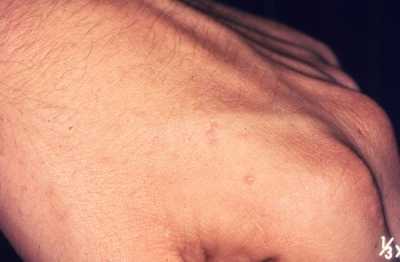
28 Dec Scabies: For Community Control, Exam of Just Arms and Legs May Be Sufficient
MedicalResearch.com Interview with:
Michael Marks MRCP DTM&H PhD
Clinical Research Department, Faculty of Infectious & Tropical Diseases
London School of Hygiene and Tropical Medicine
Hospital for Tropical Diseases
London, United Kingdom
Twitter @dr_michaelmarks
Daniel Engelman MBBS; BMedSci; MPHTM; FRACP; PhD
Centre for International Child Health, University of Melbourne,
Tropical Diseases Research Group
Murdoch Children’s Research Institute
Melbourne, Australia
Twitter @Dan_Engelman

The lateral aspect of the left hand depicted here, reveals the presence of papules due to an infestation of the human itch mite, Sarcoptes scabiei var. hominis, in a case of what is commonly referred to as scabies.CDC image
MedicalResearch.com: What is the background for this study?
MM: Scabies is extremely common. Globally in the region of 100-200 million people are believed to be affected by scabies annually.
Recently the WHO has recognised Scabies as a ‘Neglected Tropical Disease’ in response to this burden of disease. There has been increasing interest in using Mass Drug Administration (treating whole communities) as a strategy to control scabies in communities. In order to make this practical countries need an easy mechanism for establishing if scabies is a significant problem in their communities. In general when treating an individual, clinicians would conduct a full body examination to diagnose scabies – however this may not be practical or necessary when making decisions about whether to treat whole communities.
DE: Despite the fact that Scabies is a very common condition that causes a great deal of health problems, it has been largely neglected by health, research and funding agencies – but pleasingly, the WHO has now started to take action on scabies control, starting with the recognition of scabies as a “Neglected Tropical Disease”

Scabies Mite
CDC image
MedicalResearch.com: What are the main findings?
MM: In our study we demonstrate that limiting the examination to just the arms and the legs below the knee detected > 90% of cases of scabies. Whilst a few cases are missed this does not matter as much when the aim of the examination is to decide about treating whole communities – because all the cases would get treated as part of subsequent MDA.
MedicalResearch.com: What should readers take away from your report?
MM: Our study suggests that simpler examinations would still be adequate for making public health decisions about scabies in endemic communities. This should ultimately make it easier for countries to take action to control scabies in their communities.
MedicalResearch.com: What recommendations do you have for future research as a result of this work?
MM: This study fits alongside the recently published International Alliance for the Control of Scabies criteria for the diagnosis of Scabies ( https://journals.plos.org/plosntds/article?id=10.1371/journal.pntd.0006549). We (led by Dan Engelman) are currently working to cvalidate both these diagnostic crtieria and the limited examination strategy.
DE: The aim is to have less training and experience required for nurses and health staff to diagnose scabies.
MedicalResearch.com: Is there anything else you would like to add?
DE: The International Alliance for the Control of Scabies is leading work and bringing together global experts and stakeholders to advance the scabies control agenda.
(See also https://journals.plos.org/plosntds/article?id=10.1371/journal.pntd.0002167 )
No disclosures.
Citation:
Exploration of a simplified clinical examination for scabies to support public health decision-making
Michael Marks ,Daniel Engelman,, Lucia Romani,, Daniel Mason,, Oliver Sokana, Mike Kama, Margot Whitfeld, Andrew C. Steer, John Kaldor
Published: December 27, 2018
https://doi.org/10.1371/journal.pntd.0006996
[wysija_form id=”3″]
[last-modified]
The information on MedicalResearch.com is provided for educational purposes only, and is in no way intended to diagnose, cure, or treat any medical or other condition. Always seek the advice of your physician or other qualified health and ask your doctor any questions you may have regarding a medical condition. In addition to all other limitations and disclaimers in this agreement, service provider and its third party providers disclaim any liability or loss in connection with the content provided on this website.
Last Updated on December 28, 2018 by Marie Benz MD FAAD
